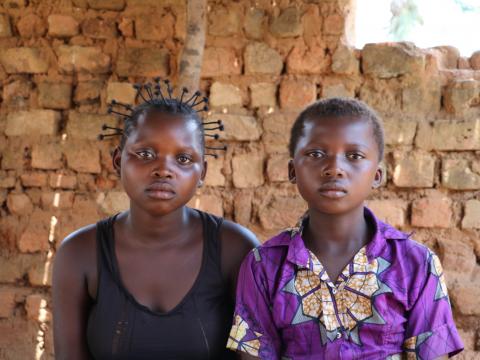Mputu and Bakandi | Girls on the move fleeing conflict in Kasai, DRC

In August 2016, a dispute between the government and the heir to a local chieftaincy in the Kasai Central province of the Democratic Republic of Congo quickly spiraled into widespread violence after the death of the chief. His followers, known as the Kamunia Nsapu, increased their attacks on government agents, and violence quickly spread across all five provinces of the Grand Kasais. In some areas, violence took on a tribal and ethnic dimension.
I met Mputu, 15, and Bakandi, 11, when World Vision was distributing food in their grandmother’s village in Dibaya territory, in Kasai Central. But Mputu and Bakandi have only recently arrived in Dibaya. They grew up over 500km away, near Tshikapa in Kasai province, where the conflict turned their lives upside down this spring.
Mputu explained to me how she and her sister arrived in Dibaya.
“We came here after they killed our father. They came into our house before dawn, and cut off his head. The Batshioko and Bampende tribes hate the Lululua.”
“After they killed him, we fled. We went through Kamako, and then Mutelu to Tshikapa.”
“It took us three days on the road from Tshikapa to Kananga, and then from there we came here. We’ve been here for three months now.”
Mputu and Bakandi were relatively lucky. Unlike many families who fled the 500 some odd kilometres on foot, their neighbours were able to scrape together enough money to send them to Kananga, the regional capital of Kasai Centrale, via car. But the experience of being suddenly bundled off was still traumatising.
“Even though they’d sent us money to take a car, we were stressed as we travelled through other communities. We weren’t happy, we were scared. We didn’t take anything with us when we left.”
Mputu and Bakandi are among the 1.6 million who have had to flee their homes in the Grand Kasais since August 2016. About half of all families have now returned home, but some, like the girls, are unlikely to ever go back. With parents killed and homes burnt, many children have been taken in by their extended families, who often struggle to care for the extra mouths.
Life here in Dibaya has been a big difference for the girls. Their father was a diamond buyer in Tshikapa, and his income ensured the girls ate well and went to school. Their grandma lives in a rural area, a three-hour drive on terrible roads from the regional capital in Kananga.
“We had a good life in Tshikapa before the battles.” Mputu remembered. “We ate well because our father was still alive. We ate everything – fufu, meat, beans, rice. Here we don’t eat well at all.”
“In Tshikapa we went to school. I was in 8th grade (2nd year of secondary school) and my little sister was in 5th grade, but we fled before the end of the school year last year. In Tshikapa we had good things, but here we don’t have anything. There’s nothing here at all.”
Since July the situation has mostly stabilized in Kasai Central, although security is still chancy in Tshikapa, and there are many families in Dibaya who have recently fled the region.
“We’re seeing increasing numbers of families arrive in Dibaya territory – both returning families, and families fleeing violence in other parts of the Kasais who are coming to stay with relatives. These families have lost everything they own, and are struggling to eat, often surviving on just cassava leaves and a bit of oil. These people haven’t received any humanitarian aid before – ever – and the needs our teams are seeing are immense,” Bovet Tombola, Kasais Response Food Assistance Coordinator, explained at the distribution site.
World Vision is working with World Food Programme to provide food to displaced and vulnerable families living in Dibaya territory. In October 2017, we distributed almost 2 thousand tonnes of food to 10,602 families, providing them with a one month supply of flour, beans, oil, and salt. In November and December, we will be scaling up our efforts to reach a total of 100,000 people with urgently needed supplies.